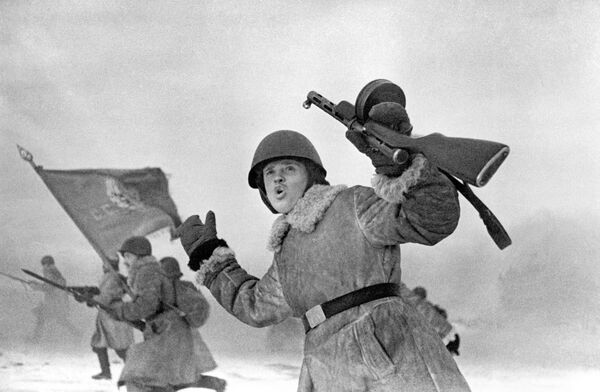The Second World War formally ended on September 2, 1945 with Japan's surrender. There is a popular saying that a war is over when the last soldiers killed are buried. With WWII, however, things aren't so simple.
The Second World War was a beast born of WWI, known in Europe as the Great War. Some alternative historians see them as two phases in the same war, separated by a fragile truce. This seems logical: For thirty years, the world tried to destroy itself in trenches and gas chambers, at logging sites and in slums blighted by misery and unemployment. It measured the shapes of skulls and class distinctions, and meticulously calculated the percentage of Jewish or Japanese blood in people destined for death camps or internment camps.
By 1945, after tens of millions had died, the world finally came to its senses and began to deal with the aftermath. Nuremberg and Tokyo, a policy of zero tolerance for Nazi and fascist ideologies, criminal responsibility for soldiers who were "just following orders", the concept of crimes against humanity, the Simon Wiesenthal Center, and a manhunt for war criminals that continues to this day. This horrific period in human history culminated in Hiroshima and Nagasaki, the cornerstone of modern humanity's atomic myth, which furthered pacifist attitudes around the world.
It must have been the living memory of WWII that pulled the world back from the brink of a new "hot" war in the 1950s and '60s. The thirteen-day Cuban Missile Crisis in 1962 was a dangerous balancing act. Humanity pulled back from the brink of the abyss thanks only to the fact that the Second World War has never ended. All nations engaged in hostilities in the 1940s continue fighting to this day on an invisible front, in a varying degree, either against each other or themselves.
Japan's prime minister is berated by the liberal press for visiting the Yasukuni Shrine every year to pay tribute to Japanese soldiers killed in WWII. German historians unvaryingly estimate the number of civilians killed during the Allied bombings of Dresden at 18,000-25,000 - this despite 60 years of related studies and numerous alternative estimates that put the number of civilian casualties as high as 60,000-100,000 and even more.
But there is little hypocrisy in all this: It's just that the winners have made the losers adapt their minds and behavior to a different reality. The nations that unleashed WWII, Germany and Japan, have now had a guilt complex built into their collective consciousness.
When you are taught to be ashamed of a period in your country's history for decades, at some point you will turn your attention to plans for the future instead of searching for answers in the past.
Paradoxically, the Allies are facing far greater problems with their national identities. The United States is the least affected, because it won the subsequent battle against the Eastern bloc.
WWII remains one of the most painful subjects in Russia's history. The nation's fresh memories of that war and its grief for the victims (around 14% of the population, according to some estimates) were transformed by the Soviet regime into a jingoistic ideology, devoid of any living emotion. This ideology was used to hold the country together in the final decades of the Soviet Union, after Communist ideals had already lost their universal appeal.
Little has changed since then. Moscow is still trying hard to uphold the image of Russia as a victorious nation. It has now declared war on those who try to falsify the history of WWII, and it ferociously battles against "misrepresentations" made by ex-Soviet republics and countries of the former Eastern bloc.
The Communist idealism of the 1920s-'60s may seem naive to new generations of Russians, who came out of the anarchy of the early post-Soviet years with a cynical outlook. But the philosophy built around those ideals probably had more substance and more capacity to unite the nation than the new WWII jingoism. Perhaps most significantly, it was a future-oriented philosophy.
Many will recognize this photo, taken on board USS Missouri in Tokyo Bay on September 2, 1945. The one-legged Foreign Minister Mamoru Shigemitsu of Japan has put his walking stick aside and bent over a low table to sign the Instrument of Surrender. Looking on from across the table is Lieutenant General Richard Sutherland, the Chief of Staff to General Douglas MacArthur, Commander of the Allied Force in the Pacific. It looks as if Shigemitsu is bowing ceremoniously to the victors. An apologetic smile on his face would have made that impression complete. But looking at this photo, it is hard to imagine the U.S. conservatives of the 1970s, who saw Japanese cars pushing Fords and Chevrolets off American roads and asked, "For this we fought on Okinawa and Guadalcanal?"
The nations defeated in WWII have been deprived of a large chunk of their history, and they have made up for it by creating a new future for themselves and giving other nations no choice but to accept it. The winners, meanwhile, content themselves with proudly looking back on their glorious past.
Winners always have something to lose, and they often get stuck in the past as a result. Losers, on the other hand, have no choice but to look forward.
Perhaps it is time for Russia, the loser in the Cold War, to stop building bronze monuments to itself and to start looking for ways to build a new future, as its WWII adversaries have.
Konstantin Bogdanov, for RIA Novosti
The opinions expressed in this article are the author's and do not necessarily represent those of RIA Novosti.

